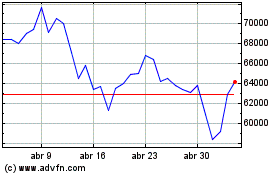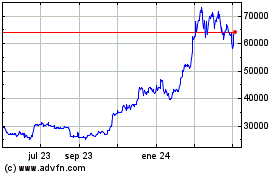Bitcoin’s Network Strengthens: Mining Difficulty And Hash Rate Spike Amid ETH ETF Buzz
23 Mayo 2024 - 9:00PM
NEWSBTC
Bitcoin mining difficulty has adjusted upwards by nearly 2%,
reaching over 84.4 trillion, as the network’s average hash rate
surged past 600 EH/s. This increase comes amid growing optimism in
the crypto market, particularly due to speculation about the
potential approval of spot Ethereum ETFs in the United States.
Notably, Bitcoin mining difficulty measures how difficult it
is to find a hash below a given target. The Bitcoin network has a
global block difficulty that adjusts every 2,016 blocks (roughly
every two weeks) to ensure that the time between blocks mined
remains around 10 minutes, despite the number of miners and their
growing computing power. Related Reading: Bitcoin’s Significant
Adjustment: Mining Difficulty Hits 18-Month Low – What’s Next For
Miners? This difficulty adjustment helps maintain the network’s
regular block time, ensuring stability and security. Significant
Shifts In Bitcoin Mining The adjustment of BTC mining difficulty
seen earlier this month marked a significant shift, as the metric
saw a drop of nearly 6%, the largest decrease since the bear market
in December 2022. This rebound in hash rate from the 580-590 EH/s
range to over 600 EH/s aligns with a broader crypto market rally
fueled by expectations of regulatory advancements in Ethereum
products. The concept of mining difficulty is crucial for
understanding how Bitcoin self-regulates the production of new
blocks. The difficulty increases as more miners join the network,
making it harder to mine new blocks. Conversely, the difficulty
drops if the number of miners decreases, making mining easier. This
mechanism ensures that the introduction of new BTC into the market
remains steady and predictable, irrespective of fluctuations in the
number of miners. This recent increase in mining difficulty
coincides with a slight recovery in Bitcoin’s hash price, which had
fallen to an all-time low at the end of April. The hash price, a
metric developed by Luxor, a Bitcoin mining services firm, measures
the expected earnings per unit of hash rate daily. It has rebounded
from less than $50 per PH/s per day to around $54.6 per PH/s per
day, providing a minor relief to miners after the recent market
downturns. Bitcoin’s Price Movements And Future Expectations While
Bitcoin’s price has experienced a minor dip of 2% in the last 24
hours, it maintains a weekly uptrend of 3.9%, trading at $68,132.
This movement is closely watched as investors and traders await the
US Securities and Exchange Commission’s decision on spot Ethereum
ETFs, which could significantly influence the entire crypto market.
In response to these developments, a prominent analyst known as
BitQuant shared insights via social media platform X, predicting
substantial growth for Bitcoin. According to BitQuant, Bitcoin is
expected to reach $95,000, with a significant rise to $80,000
anticipated in May. Related Reading: Bitcoin Price Drop Below
$70,000 Apparently Driven By Lack Of Interest, Glassnode Data Shows
However, BitQuant also forecast a sharp decline from this local
peak in June, maintaining that the overall timeline for this top
has not changed. Several updates for those here to build
generational wealth and not involved in day trading: 1. Yes,
#Bitcoin is going to $95K. 2. Yes, $95K will extend to June, but
the sharp decline from this local top will also occur in June, so
the overall timeline for this local top hasn’t…
pic.twitter.com/VFvMweBVbs — BitQuant (@BitQua) May 22, 2024
Featured image created with DALL·E, Chart from TradingView
Bitcoin (COIN:BTCUSD)
Gráfica de Acción Histórica
De May 2024 a Jun 2024

Bitcoin (COIN:BTCUSD)
Gráfica de Acción Histórica
De Jun 2023 a Jun 2024
